On the Ground in the Fight Against Carbon Pipeline Scams in Iowa
Published Dec 21, 2023
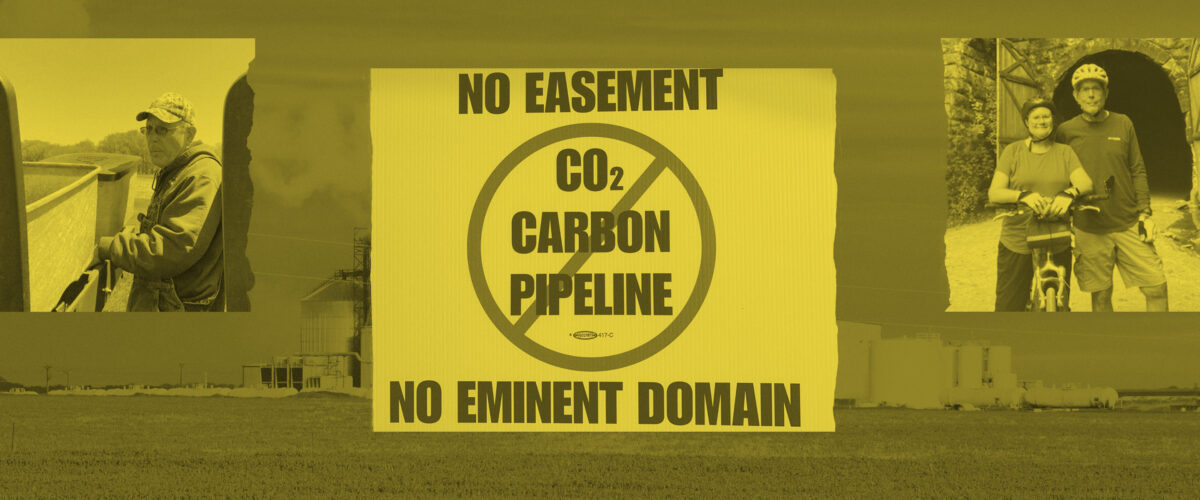
Amid environmental and economic crises in rural America, corporations are pushing dangerous climate scams. Here’s the story of a fight against one of the biggest: carbon pipelines.
In January 2022, Susan Stoefen was listening to a livestream of the Scott County Board of Supervisors’ meeting, as she sometimes does. For 20 years, she and her husband, Jerry lived just outside of New Liberty, Iowa on more than a hundred acres of woods, pasture, and farmland.
During that Board meeting, folks from a company called Wolf Carbon Solutions spoke about plans they had for a carbon pipeline project. Wolf was proposing to use carbon capture technology to collect carbon dioxide emissions from their Iowa ethanol facilities. Then, the pipeline would send the CO2 from Iowa to Illinois, to be stored deep underground.
Susan didn’t think much of it at the time. But that changed in the summer, when she and Jerry learned what the pipeline meant for them. Soon, they found themselves in the midst of a battle that has reverberated throughout Iowa and the Midwest — one that has pit communities against corporations and will shape the future of farming throughout the region.
The Risks of Having a Carbon Pipeline for a Neighbor
In August 2022, the Stoefens made a disconcerting discovery. A local newspaper published a map of the route Wolf proposed for its pipeline — and it seemed to cross right through their property.
They hadn’t received any notice of the possibility. In fact, they wouldn’t even get confirmation until they spoke with one of Wolf’s land agents at a public meeting. So Susan and Jerry began asking questions, and what they discovered only heightened their concerns.
The Stoefens were no strangers to pipelines. They lived about three miles from an oil and gas line. Jerry recalled the workers coming out every few years to dig it up for repairs. “I personally wouldn’t want to have one on my property,” Susan said. “I don’t like that stuff, wouldn’t want to worry about it.”
The Wolf pipeline was even more alarming, given how close it would be to their home — and the fact that it would carry potentially deadly CO2. Compared to oil and gas, CO2 pipelines are severely understudied, especially when it comes to safety and accident response.
One such accident has already occurred. In 2020, a ruptured carbon pipeline in Satartia, Mississippi sent more than 40 residents to the hospital. And since CO2 displaces the oxygen needed to run combustion engines, emergency vehicles and cars couldn’t reach many residents to help them evacuate.
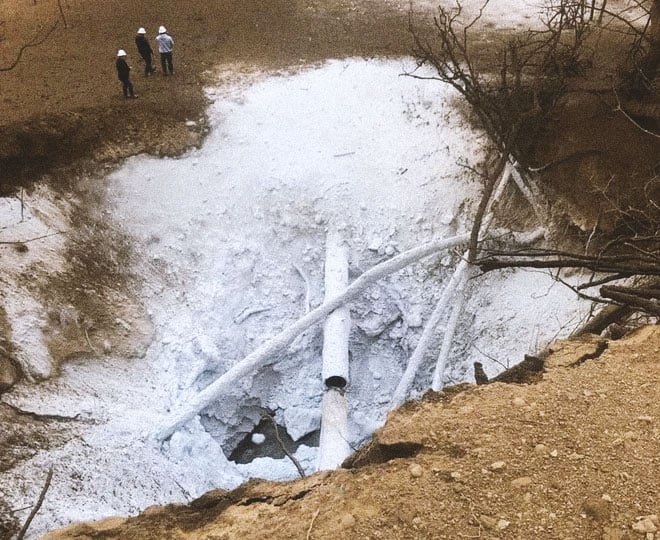
After attending public meetings and reading up on the proposed pipelines, it became clear to the Stoefens that officials were underprepared for such an incident. To Jerry, it seemed their strategy was to wait for an accident to do serious damage, rather than work to prevent harm in the first place.
Pipeline Companies Dive for Greenwashing Cash
Following the disaster in Satartia and public pressure, federal regulators began considering new safety rules for carbon pipelines in 2022. However, as the rulemaking process stretched on, pipeline companies plowed forward with their projects, in an effort to beat the buzzer on regulations.
That included not only Wolf but also Navigator CO2 Ventures and Summit Carbon Solutions. Combined, the three corporations proposed 2,000 miles of carbon pipeline in Iowa, with even more across the Midwest.
That’s because where the Stoefens see danger, these companies see dollar signs. The pipelines allow them to cash in on federal subsidies and paint another layer of greenwashing over the dirty corn ethanol industry.
Corporations have long-touted ethanol as a greener, climate-friendly alternative to gasoline. But over the years, research has proved this false. Ethanol is not only worse for the climate than gasoline; it also ruins the environment. Intensive corn farming destroys soil health, while flooding farmland and waterways with toxic pesticides and fertilizers.
However, with projects like Wolf’s, the ethanol industry is making a cynical ploy to boost its image. It claims carbon capture and storage can reduce ethanol’s climate impact by collecting CO2 emissions from facilities and storing them underground.
But carbon capture is an expensive climate scam. It has been proven to fail in pilot projects across the globe. And it gives dirty industries like ethanol license to continue business as usual.
Perhaps that doesn’t concern pipeline corporations, because they’ll benefit whether it’s good for the climate or not. Federal subsidies promise them $85 per ton of carbon captured. Amid a sea of other proposed projects, Wolf’s alone could cost taxpayers roughly $1 billion per year.1Wolf projects it will capture up to 12 million tons of CO2 a year. Yet, there are few policies in place to verify that companies actually capture carbon.
You can learn more about the Stoefens, carbon pipelines, and other climate scams in our latest report, “Selling Snake Oil: Big Ag’s False Solutions in Iowa.”
Carbon Pipelines Would Entrench Dirty Corn Ethanol
One of the biggest harms of projects like Wolf’s is how they would prop up the ethanol industry. Over the past few decades, deregulation has made farmers more vulnerable to sudden market shifts, and growing corn for ethanol was heralded as a strategy to boost farm income. But ethanol has mostly benefited big agribusinesses and driven small farms out of business.
Moreover, corn ethanol has transformed the landscape of the Midwest. Land best not farmed — hills, pasture, land with poor soil — has been strong-armed into corn fields. “You’ll see a lot of hill around Southern Clinton County right by us, and in Northern Scott County,” Susan Stoefen said. “You’d never seen them farmed in my whole life until ethanol.”
The result: summer heat burns fields to a crisp because the soil can’t hold water. Vast amounts of fertilizer run into creeks and rivers, all the way down to the Gulf of Mexico. Family farms, generations old, are forced to shutter.
And now, with the rise of carbon capture and carbon pipelines, the ethanol industry just might get more wind under its sails.
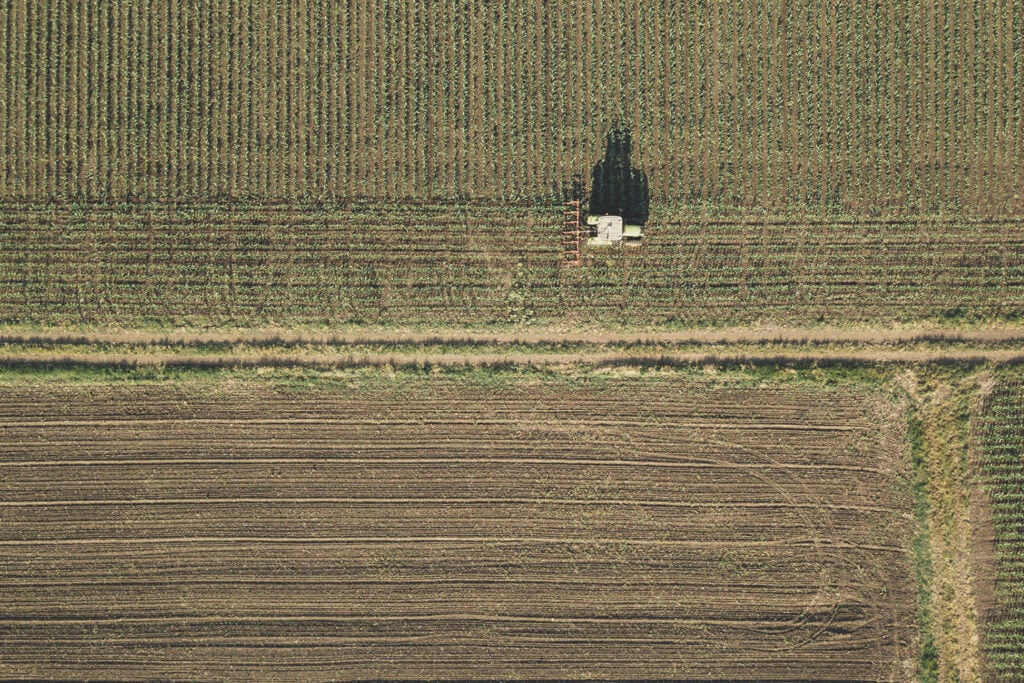
What the industry won’t tell you, though, is that the carbon capture–ethanol combo is already failing. For instance, since ag giant Archer Daniels Midland began capturing carbon from an ethanol plant in 2017, it has consistently met only half of its yearly targets. Including the carbon emitted when the ethanol burns, this accounts for just 3% of the company’s emissions.
The Stoefens are skeptical that carbon capture will make ethanol climate-friendly. “The whole idea of it, these carbon pipelines, is not a good solution to the problem of carbon,” Susan said. “It’s just going to allow businesses to create carbon.” The real solution is to cut carbon emissions at the source.
Carbon Pipeline Proposals Are Corporate Land Grabs
Since the summer of 2022, the Stoefens have become fierce advocates against carbon pipelines. More and more Iowans and communities across the Midwest have joined the fight, as well.
They’re concerned not only about the pipelines but also how corporations are pursuing the projects. Summit and Navigator both indicated they would seek approval to use eminent domain for their projects in their permit applications. This would allow them, if permitted, to build on private property whether or not landowners give permission. While Wolf has yet to pursue eminent domain, that may change if it can’t get enough voluntary easements.
Over the past few years, this has become a major issue in Iowa politics, uniting people across the aisle and from all walks of life. In 2022, polling from our partner organization Food & Water Action found that about 8 out of 10 Iowans opposed the use of eminent domain for carbon pipelines.
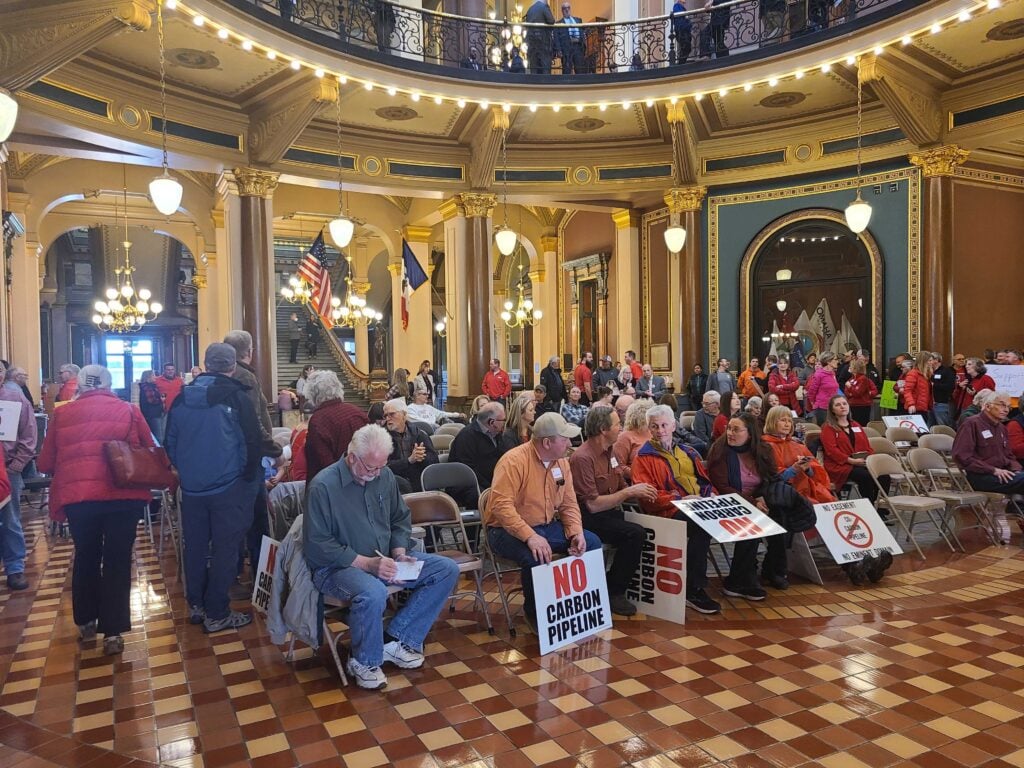
Grassroots organizing has led the fight across Iowa and the entire Midwest against carbon pipelines. Community residents, such as the Stoefens, have worked to educate their neighbors and speak out about the projects as much as they can.
And this work has paid off. In November 2023, Wolf temporarily pulled its Illinois pipeline application. In October, Navigator’s canceled its 1,300-mile line. While the fight goes on, these are tremendous victories that show the power of organizing.
We Deserve a Livable Future Without Carbon Pipelines
For decades, corporate greed has shaped our food system. This has driven linked environmental and economic crises — wreaking havoc on farmers’ livelihoods, as well as the land, water, and climate we all depend on.
Schemes like carbon pipelines pledge to address problems; but in reality, they only prolong the status quo.
The solutions to these crises do not lie with Big Ag and dirty energy corporations. In fact, small- and medium-sized farms are leading the way with practices that are actually sustainable. The Stoefens encourage no-till farming, cover crops, crop rotation, and mixed farming, and they practiced many of these techniques when they farmed their land.
However, the system is currently stacked against such changes. U.S. policies shape a “get big or get out” dynamic that Big Ag thrives in and takes advantage of. Nevertheless, community activists and farmers are proving that change is possible.
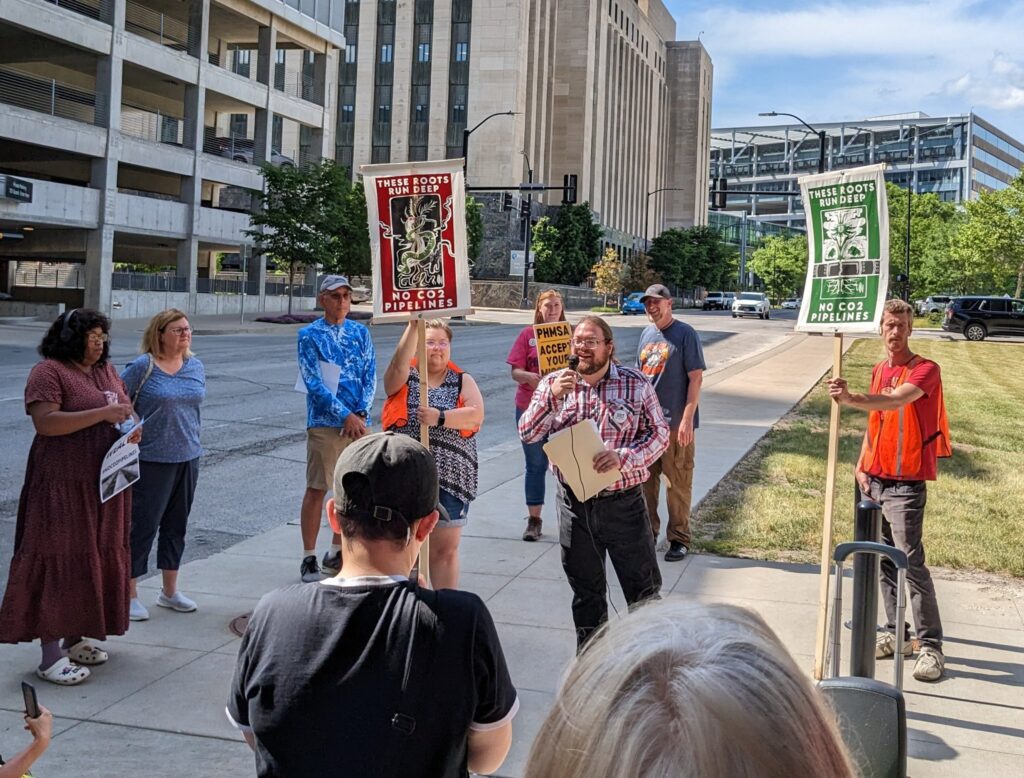
Such change starts with more awareness about how all these issues are connected, the Stoefens said. “People should take some time to learn about this stuff,” Susan told us. “Learn where their food is coming from, how their food’s being produced, where their energy’s coming from.”
“People should take to heart a message of clean water, clean air, good food, ‘save the land,’” Jerry added. That’s what’s happening in Iowa, and it’s driving a campaign that stopped the Navigator pipeline and continues to fight Wolf and Summit.
As more scams arrive on our doorsteps, Iowans and people nationwide are making it clear: We deserve safe communities, a well-cared-for environment, and thriving, sustainable small farms. That doesn’t include corporate greed or carbon pipelines.
Tell President Biden to stop support for carbon capture scams!
Enjoyed this article?
Sign up for updates.
TO TOP
Endnotes


